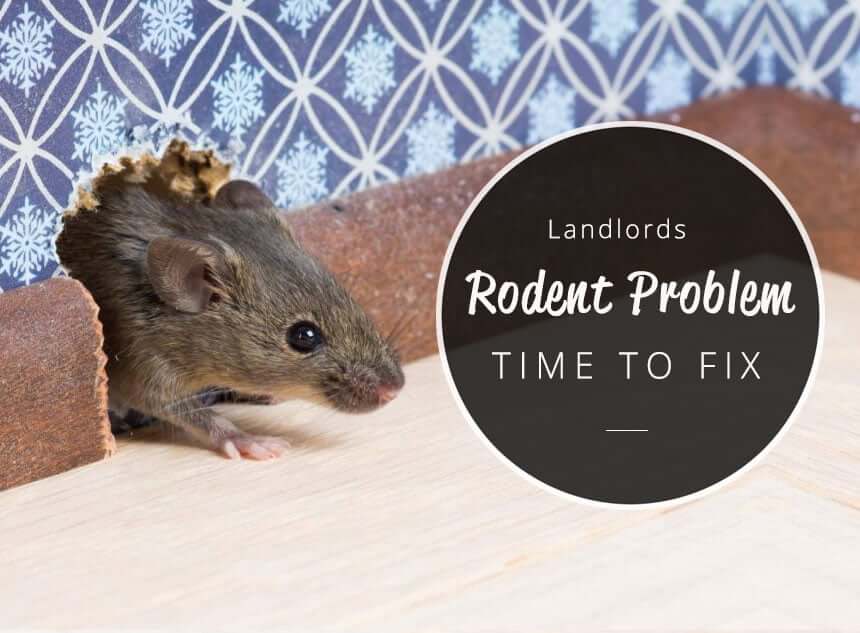If you have a rodent problem, report it to your landlord immediately. Depending on where you live, landlords have a responsibility to keep their rental properties in proper living conditions.
The landlord has up to 30 days to fix a rodent problem reported by their tenants in writing. Different jurisdictions require that tenants provide ample time to their landlords to solve problems reported to them. If they do not, tenants can pay to have it fixed and remove the charge from the next rent payment.
Both tenants and landlords have a responsibility to fix rodent problems when they arise.

Check your lease agreement
The lease agreement should record the party responsible for pest control. Landlords include a pest control clause in the lease. The responsible party in the lease should then take up the pest remediation exercise.
However, landlords should not leave pest control to their tenants. They should do all they can to ensure that their property is habitable.
Handle complaints quickly
When your tenant makes a complaint about pests on your property, you should, as a landlord, act fast. Depending on where your property is located, the law may allow 14 to 30 days to solve the pest problem.
To keep your tenant happy, act fast. A happy tenant is likely to renew their lease. Solving tenants’ problems quickly keeps them satisfied and likely to stay longer in your property.
Additionally, pest control is a form of protecting your property. If you do not solve the problem early, it may blow up to become more expensive and can cause your property to get banned.
Find the source of the pests
To resolve the rodent problem, you need to find out where they are coming from. Rodents enter a property through openings on the walls or roof. Have your property inspected and checked for holes or gaps in the structure of the property that rodents can pass through. Rats and mice can pass through a ¼-inch hole anywhere on the property.
Exterminate
When you know the source of the pests, exterminate them. You can hire professional exterminators or you can use DIY methods.
The extermination methods you use depend on the extent of the infestation. Hire professionals if there are many rodents on the property. For a few mice and rats, you can set up glue traps in the strategic part of the property where the rats frequently visit.
Keep records
When you take action on a tenant complaint, record the complaint, the action to resolve the problem, and the date. The records will come in handy if the tenant claims you did not respond to their complaints.
What should tenants do when there are pests in their home
Report
As soon as you spot signs of a rodent infestation, report it. Make your report in writing to your landlord. Also, add some photo evidence of your complaint.
It is hard to see rats and mice when they infest your home. However, you can see evidence of their presence in their droppings. You will find them in your kitchen or the corners of your house. Take a photo of the mouse droppings and include them as part of your report to the landlord.
You can send the landlord or their agent an email with the photos. Sending an email ensures that you have a record of your complaint.
Clean up
Rodent and pest infestations are caused by dirt. Therefore, whenever you see signs of infestation, clean your whole house. It is a step in ensuring that the infestation does not grow.
Check your lease agreement
Lease agreements indicate who between the tenant and the landlord is responsible for pest control. Depending on where you live and your landlord, the responsibility may fall on you, the tenant, or the landlord.
If the lease states that you are responsible, hire a professional pest extermination service. Do it as soon as you see signs of an infestation. It ensures that they do not multiply and become hard to handle.
If the responsibility falls on the landlord, take photos of your evidence and report to them or their agent in writing. Also, ask that they let you know how soon an exterminator can visit your home.
Check local laws
Depending on where you live, there may be tenant-landlord laws on pest control. They govern the relationship between a landlord and a tenant in the issue of pest management.
Do as your local law suggests you should.
What can a tenant do if the landlord does not act on a rodent problem?
Withhold rent
Different states allow tenants to withhold rent until the landlord has solved a pest problem. However, before you do it, you need to have allowed the landlord ample time to solve the problem.
Depending on the state you live in, ample time for the landlord to solve your problem is 14 to 30 days after reporting.
Break the lease
If the landlord does not provide a solution, you can break your lease without the obligation to pay for the remaining period. Some states allow tenants to move out of houses if the landlord does not exterminate pests after getting the complaint.
Deduct rent
Some states allow tenants to pay for the extermination and deduct the amount from the subsequent rent. The law will stipulate how much money the tenant can deduct from the rent to hire an exterminator. You must also provide your landlord with a receipt for how much you paid for the service.
If you have to move into temporary housing, you can also deduct the cost from the rent.
How to get rid of mice in a rental property
Get a cat
If your lease allows you to keep pets, get a cat. It will effectively scare away or eat as many mice as may come into your home. Even with a large rodent infestation, a single cat is enough to clear it in a few days. You can either get a kitten or an adult cat.
Some landlords may not allow their tenants to keep pets on their property.
Proper lawn maintenance
You will have to maintain your lawn properly. Cut the grass and keep it short at all times. Ensure that the exterior of your property is clean and does not provide areas where rats and mice can hide only to get into your house later.
When you eliminate their hiding place, you finish the likelihood of an infestation.
Lay traps
If you identify rice and mice in your trap, you can set up multiple traps within your home. You can use the traditional traps or glue boards. Place them on the path of the rats and mice. Check the traps every morning and throw away the glue board together with all the mice it has caught.
Keep your house clean
Rodents and mice are attracted by food and dirt. Make sure to wash your dishes after every meal. Clean or mop your home every day. In this way bits and pieces of food on the floor that can attract rats and mice are eliminated.
If you have a food pantry, keep it clean. Rodents always end up at the food. Arrange your pantry neatly. Ensure that there is nothing on the shelves and floor that can attract rodents.
Additionally, clean out all the other storage areas in your house. Old books and magazine piles are a favorite hiding space for rodents.
Seal all entry points
Rodents are small and can enter the house through cracks that you may overlook. Hire a pest exterminator to inspect your home. The inspection should ensure that all holes, gaps, and openings that rodents can gain access into your house are sealed. In this way, you can avoid an infestation in your house.
Hire A Professional For Rodent Extermination
If you want to keep your home free of rodents, call a professional exterminator.
Gotreequotes.com is a free-to-use tool that connects homeowners to professional Pest Removal service providers.
To use this tool:
- Enter your location zip code at the top of the tool.
- Fill in the provided form to provide more details on the pest removal service you require.
- You will receive three quotes from professional pest control service providers.
- Contact and hire a service provider who falls within your budget to remove the pests for you.

When to call a professional for a pest extermination
- When you are dealing with rats and mice. They are small and fast making them difficult to catch. An infestation means that there’s more than a single random mouse running around your home. If this is the case, call an exterminator to help you get rid of them.
- If the infestation gets worse. If you have tried every solution to get rid of the pests without success, hire a professional. They have chemicals that will kill the rodents and mice in your homes.
- Reoccurrence. If you get a re-infestation, get an exterminator. A recurrence means that the pests were not completely gone. A professional will remove them with specialized skills and chemicals to chase them away once and for all.
- If there are children in the house, hire a professional to exterminate all pests infesting your home. You will protect your children from diseases and disease-causing germs.
Signs of a pest infestation
- Droppings
- Nesting
- Grease Tasks
- Physical damage
Pros vs DIY rodent removal
For a minor infestation, you are better off removing the mice with a trap. Unfortunately, doing these may not eliminate the mice. If you choose to DIY, you can use sustainable material traps.
If you choose to DIY, you may not find the source of the rodents. Therefore, you can expect a reinfestation. Hire a pro to remove rodents from your home as they are likely to cause diseases to you and everyone who lives in your house.











